
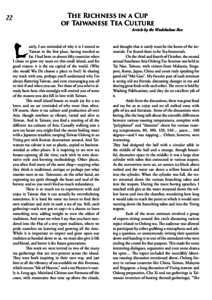 |
|
Lately, I am reminded of why it is I moved to Taiwan in the first place, having traveled so far. I had been to almost fifty countries when I chose to grow my roots on this small island, and for good reason: it is the tea capital of the world. (Why else would Wu De choose a place to live?) In sharing my week with you, perhaps you'll understand why I'm always flattering Taiwan, and even encouraging you all to visit if and when you can. For those of you who've already been here, this nostalgia will remind you of some of the reasons you also fell in love with Taiwan.
This small island boasts so much joy for a tea lover, and we are reminded of why more than often. Of course, there is tea culture and production all over Asia, though nowhere as vibrant, varied and alive as Taiwan. And in Taiwan, you find a meeting of all the different tea cultures of Asia. Casually walking into a new tea house you might find the owner boiling water with a Japanese tetusbin, steeping Taiwan Oolong in an Yixing pot with Korean decorations around. And Taiwanese tea culture is not as plastic, copied or businessminded as other places. It is inspiring to see new tea houses opening all the time, each with its own decorative style and brewing methodology. Other places, you often find many of the same shop - copying what they think is traditional, antique or perhaps just what tourists want to see. Taiwanese, on the other hand, are expressing tea spirit through the heart and soul of the brewer, and so you won't find so much redundancy.
There is so much tea to experiment with and enjoy in Taiwan that it can actually be overwhelming sometimes. It is hard for some tea lovers to find their own tradition and style in such a sea of tea. Still, each gathering - each new pot or cup - is a chance to learn something new, adding insight to even the oldest of traditions. And trust me when I say that you have wandered into the Hut of a very open tradition, where we pride ourselves on learning and growing all the time. While it is important to respect and grow upon our tradition as handed down to us, we must also give it life and blood, and better it for future generations.
This week we were invited to two of the many tea gatherings that are ever-present across the island. They were both inspiring in their own way, and just hint at all the vibrancy of tea available on this Formosa, which means "Isle of Heaven," and a tea Heaven it surely is. Long ago, Mainland Chinese saw Formosa off the coast, with mountains that raise up above the clouds, and thought that it surely must be the home of the immortals. I've found them to be Tea Immortals.
On the third and fourth of October, the second annual Southeast Asia Oolong Tea Seminar was held in Tai Nan, Taiwan, with visitors from Malaysia, Singapore, Korea, Japan, China and yours truly speaking for good old "Mei Guo". My favorite part of such seminars is seeing old tea friends, discussing changes in tea and sharing great finds with each other. The event is held by Wushing Publications, and they do an excellent job of it.
Aside from the discussions, there was great food and tea for us to enjoy and we all walked away with gifts of tea and literature. Some of the discussions were boring, like the long talk about the scientific differences between various roasting temperatures, complete with "polyphenol" and "theanine" charts for various roasting temperatures, 80, 100, 120, 140... yawn... 160 degrees - and I was napping... Others, however, were interesting. They had designed the hall with a circular table in the middle of the hall and a strange, though beautiful, decorative space in the middle: it was a large clear cylinder with tubes that connected to various teapots. As the convention went on, an unseen ice block above melted and the water ran down a willow branch and into the cylinder. When the cylinder was full, the water streamed down the various branching tubes and into the teapots. During the more boring speeches, I watched with glee as the water streamed down the willow leaves and into the chamber, wondering how long it would take to reach the point at which it would start running down the branching tubes and into the Yixing teapots.
Each of the seven seminars involved a group of experts sitting around this circle discussing various topics related to Oolong tea. The audience was allowed to participate by either grabbing a microphone and asking a question, or anonymously writing their question down and handing it to one of the attendants who were circling the crowd for that purpose. This made for some interesting dialogues, arguments and even some drama for spice... The topics included the incredibly laborious roasting discussion mentioned above, Oolong history in various countries like China, Taiwan, Malaysia and Singapore, a long discussion of Yixing teaware and Oolong preparation, Cha Xi and tea gatherings (a Taiwanese invention of hosting themed gatherings), "The Old tea caddies at Master Lu's shop Future of Taiwan Oolong Tea" (also boring), and an interesting discussion of what makes Oolong tea special.
I had a chair and a small voice in the last of those discussions, about Oolong tea. I think they wanted me to talk about if Oolong has spread to America and what tea culture there is like. Instead, I politely rebuked them all. I spoke of the fact that I loved Taiwan, citing many of the reasons I already mentioned at the beginning of this article, and that it was great to hear so many of the most important people in the tea world speak about tea culture, history, production, etc., but that we won't have any more tea conventions, let alone tea culture or production, if we don't also start discussing environmental issues in the tea world. Of course, I wasn't alone. Many people agreed and one tea lover in the audience even suggested that next year's gathering have a seminar on this theme, turning to the owner of Wushing, and organizing manager in askance, hoping that they would agree on the spot. Everyone applauded and the embarrassing moment passed. I later wondered if I should have just spoken a bit about tea in America as suggested...
At night, they brought out tables in the beautiful old garden behind the cultural center where the convention was held and placed teaware on them. Last year, various shops had arranged their own Cha Xi (literally "tea stage" this refers to the decorations on which the tea is prepared). This year, however, each table had a tea sink (cha pan) with built in lights that lit up the tea table. There were pots and cups, but no other decorations. The idea was that various people could sit down and brew tea, switching every once and a while. They provided tea, but many people also brought out their own teas. You were supposed to keep your cup and wander around from table to table and try the different teas, brewers, company and conversation. This made for a quite hectic scene, but it also allowed for some interesting exchanges and the chance to try some unique teas. All in all, though, it wasn't my cup of tea... The best part of the seminar, like last year, was the enormous feast at the end. They piled us all into buses and took us off to some ritzy five-star hotel in downtown Tai Nan. There, we were treated to a twelve course extravaganza in which every single dish incorporated Taiwanese Oolong of some kind. They had a few vegetarian tables, so I was in Heaven - so stuffed I slept soundly the whole train ride back home...
If that wasn't enough tea for a week, we were invited to go on a boat cruise just three days after the convention, hosted by Master Lu. I can't drive so Kaiya, Lindsey and I took a train up to Taipei, not knowing what to expect. Master Lu had called and talked to Joyce. All we knew was that there was tea and a boat.
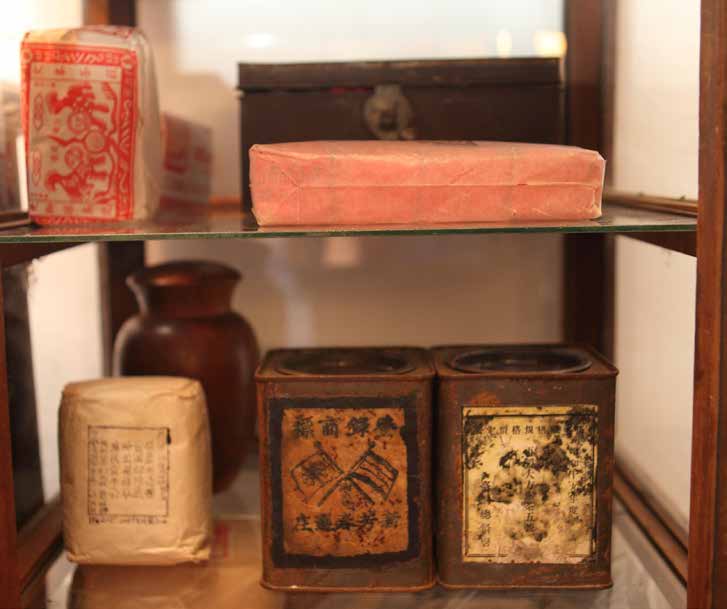
We headed to Master Lu's new shop in Taipei. It is in the Chinese medicine shop district, on one of the oldest streets, Di Hua. The house is an amazing find: an ancient wooden house backed by a small, plant-filled courtyard. Master Lu has, of course, decorated it with many antiques - furniture, tea caddies, tea boxes and teaware. We sat around and drank tea with his brother and son for a while, waiting for the boat to come at four o'clock.
We got to the dock, still wondering how this was going to play out. I knew there was a good chance it would be amazing, as some of the best tea gatherings I have been to were hosted by Master Lu. He is gracious, generous and kind; and there is often good tea, music and food at his events. The river boat was big, with ample room for the 40ish people that were coming along. Before we boarded, everyone was draped with a purple and maroon scarf of hand-dyed cloth, placed over our necks like Haiwan lei.
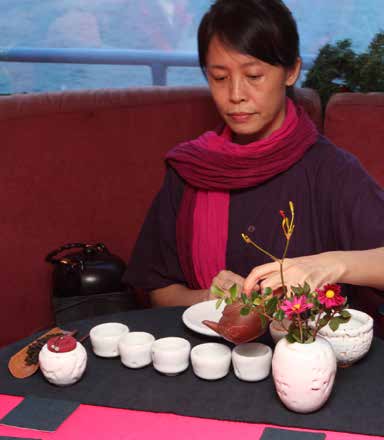
Inside, we were seated six to a table. Each table had a brewer who had arranged their own unique Cha Xi. I immediately noticed that one of the back tables had a nice woman who had brought an Yixing pot, some antique porcelain cups from the Republic era and some antique Japanese coasters. Her inviting smile and tasteful selection of teaware beckoned us to her table. She had arranged some flowers in a celadon bowl for simple decoration. Earlier, Master Lu had told me I was going to have to brew at one of the tables, so I was relieved to find them all attended to.
When we set out on our long, five-hour cruise we were spellbound to discover that one of our favorite musicians would be providing the entertainment, and that the four teas we were going to enjoy were all very special Oolongs. Shou Ge plays guitar and a lute-like instrument he built himself, with a sound somewhere between a pipa and a gu zheng, though it looks kind of like a precursor of the guitar. He also sings. His music is nice for tea. We were introduced to his music through Master Tsai, donor and highlight of our April issue. He can sing in a festive way - he's a wonderfully talented musician with a range of music - but also quiet and deep. He brought a couple flutists with him this time, and they filled our evening with great joy.
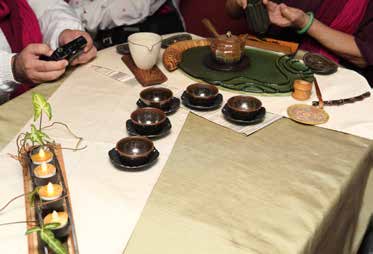
Like any good tea gathering, we are the guests of the tea. So many gatherings are disappointing because they forget this very important principal: that without tea there is no tea gathering! They create glorious Cha Xi with flowers and old cloth, and are often themed around a season, festivity, etc. They have all the great colors, sights, sounds and smells but forget about the tea, which seems to be some secondary, background opening act for all the pomp. For me, it is always disappointing to come into a gorgeous tea space and drink low-quality tea from such beautiful teaware, discussing everything but the tea we're drinking... But not at Master Lu's gatherings.
This night we were treated to four incredible teas: a 40-year-old "Iron Arahant" Wuyi Cliff Tea, a 1983 Dong Ding Oolong, a 1916 Taiwanese Bao Zhong tea and finally the star of the show, a 125-yearold Wuyi Cliff Tea that Master Lu recently acquired, which is called "Bao Quai," a varietal no longer in production. The last tea was amazing, and we could have sat drinking it all night long. It was stellar - beyond words. We all left drunk on it.
The first tea was a nice example of an aged Cliff Tea (yan cha) of the 70s, which were often lower quality for export. They usually come in little single-pot packets. Though the tea was commercial grade, the age adds a poignancy to it, enhancing what was once - long ago - a mediocre tea. There is a slight sourness under the fruity, aged qualities. The second Dong Ding was roasted by Taiwan's most famous farmer. It was fruity with a yang Qi that lingered for some time. The third tea was improperly stored, as are most aged Taiwan Oolongs. Mostly, such teas were just left in bags or drums, and very rarely intentionally stored. Still, 1916 is a long time ago. The brew was deep and wise, dark as Puerh and uplifting as green tea. After the storage flavors wore off, the true tea shone, with all the berries and elegance of a very proud bao zhong tea. The final tea was the oldest and best-stored aged Cliff Tea I have ever had. It was deep and profound in every way, carrying us off the boat to "soar with the moon" as a calligrapher who was with us on the boat later commented in the poem he wrote to commemorate the event.
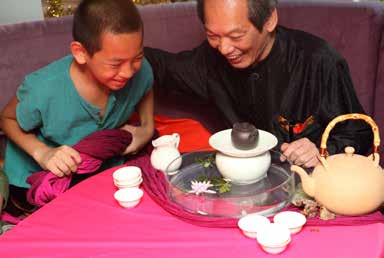
The four teas were interrupted by a dinner on the top of the ship, watching the sites of nighttime Taipei as we sailed downriver. Besides the music, we were Tea on the river boat treated to an enthusiastic lecture on the history of Taiwanese tea and how it had once been carried down the very same river we were cruising on barges headed to Keelong harbor. Master Lu was a gracious host, acting as "cha tong (tea boy)" and fetching out water from the galley, applauding the musicians, introducing the teas and occasionally sitting down at each table to make sure we were all having a good time. At the end, he said words of mastery which touched my heart: he said that the essence of tea was in the serving and sharing, and that we all would probably never again drink some of these teas, especially the last, but that despite its rarity and incredibly expensive price, he could think of no better way to drink it than by sharing it with other tea lovers. He said that hiring the boat and organizing such a gathering was his greatest joy, and the centrifuge of his tea practice. I left with those words echoing in my mind, amazed that one of my teachers, whom I respect so much, had just spent the night fetching our water...
With such a tea filled week, I was of course inspired to return home and make more tea, write about tea and otherwise drown in tea. I also said a special prayer of gratitude to Guanyin for guiding me to Taiwan, the Heaven of tea. I hope that these brief glimpses into the rich tea culture and heritage here have inspired you to start planning your next trip here to see us, or at least to return in thankfulness to the trip you have already been on. You are all so very welcome. A warm cup and a bed always await you here...